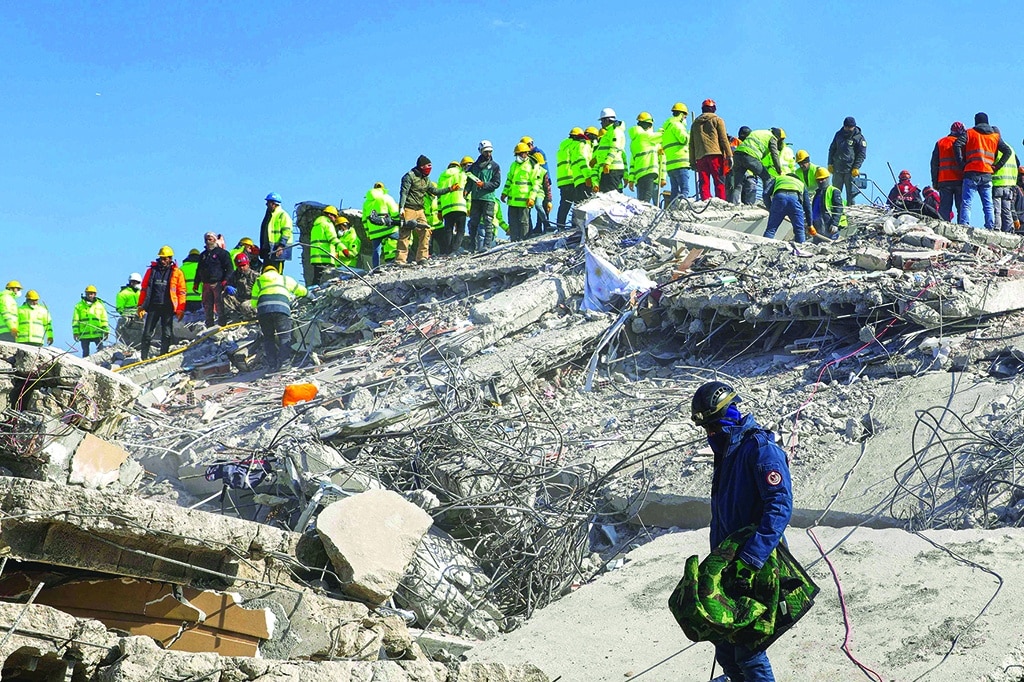KAHRAMANMARAS, Turkey: Rescuers pulled a two-month-old baby and an elderly woman from the rubble on Saturday, five days after an earthquake devastated Turkey and Syria, leaving more than 25,000 dead. Tens of thousands of local and international rescue workers are still scouring through flattened neighborhoods despite freezing weather that has compounded the misery of millions now in desperate need of aid.
However, Austrian soldiers and German rescue workers called off their searches for several hours in southern Hatay, citing a difficult security situation and clashes between local groups. In the midst of destruction and despair, miraculous tales of survival continue to emerge. "Is the world there?" asked 70-year-old Menekse Tabak as she was pulled out from the concrete in the southern city of Kahramanmaras - the epicenter of Monday's 7.8-magnitude tremor - to applause and cries praising God, according to a video on state broadcaster TRT Haber.
In the city of Antakya, a two-month-old baby was found alive 128 hours after the quake, state news agency Anadolu reported. A two-year-old girl, a six-month pregnant woman, plus a four-year-old and her father, were among those rescued five days after the quake, Turkish media reported. In southern Turkey, families clutched each other in grief at a cotton field transformed into a cemetery, with an endless stream of bodies arriving for swift burial.
Compounding the anguish, the United Nations has warned that at least 870,000 people urgently need hot meals across Turkey and Syria. In Syria alone, up to 5.3 million people may have been made homeless. A border crossing between Armenia and Turkey opened for the first time in 35 years on Saturday to allow five trucks carrying food and water into the quake-hit region.
Turkey's disaster agency said over 32,000 people from Turkish organizations are working on search and rescue efforts. In addition, there are 8,294 international rescuers. However, Austrian soldiers on Saturday suspended rescue operations in Hatay over a "worsening security situation", an army spokesman told AFP. Two dog handlers later resumed work under protection from the Turkish army.
A similar decision to halt rescue operations was taken in Germany by the Federal Agency for Technical Relief (TSW) and an NGO specializing in helping victims of natural disasters, ISAR Germany, according to an NGO spokesman. "There are more and more reports of clashes between different factions, shots have also been fired," said ISAR spokesman Stefan Heine.
The UN rights office had on Friday urged all actors in the affected area - where Kurdish militants and Syrian rebels operate - to allow humanitarian access. The outlawed Kurdistan Workers' Party, which is considered a terrorist group by Ankara and its Western allies, announced a temporary halt in fighting to ease recovery work.
In Syria, where years of conflict have ravaged the healthcare system and parts of the country remain under the control of rebels, aid has been slow to arrive. World Health Organization chief Tedros Adhanom Ghebreyesus took a flight full of emergency medical equipment into the quake-stricken city of Aleppo on Saturday. Tedros toured damaged areas of the city tweeting: "I'm heartbroken to see the conditions survivors are facing - freezing weather and extremely limited access to shelter, food, water, heat and medical care".
The Syrian government said it had approved the delivery of humanitarian assistance to quake-hit areas outside its control in Idlib province. A convoy was expected to leave on Sunday. In Damascus, Suleiman Khalil, an official at the transport ministry, said 57 aid planes had landed at Syrian airports this week. UN Secretary-General Antonio Guterres has urged the Security Council to authorize the opening of new cross-border aid points between Turkey and Syria. The council will meet to discuss Syria, possibly early next week.
Turkey said it was working on opening two new routes into rebel-held parts of Syria. The winter freeze has left thousands of people either spending nights in their cars or huddling around makeshift fires that have become ubiquitous across the quake-hit region. In Turkey, five days of grief and anguish have been slowly building into rage at the poor quality of buildings as well as the government's response to the country's worst disaster in nearly a century.
Officials in the country say 12,141 buildings were either destroyed or seriously damaged in the earthquake. "Damage was to be expected, but not the type of damage that you are seeing now", said Mustafa Erdik, a professor at Istanbul-based Bogazici University. Turkish police on Saturday detained 12 people, including contractors, over collapsed buildings in the southeastern provinces of Gaziantep and Sanliurfa, local media reported. Officials and medics said 22,327 people had died in Turkey and 3,553 in Syria. The confirmed total now stands at 25,880. - AFP











